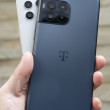Researchers Suggest Phone Makers Mislead Consumers About Security Patches
Apr 12, 2018, 1:19 PM by Eric M. Zeman
Security Research Labs says Android phone makers often miss security patches but still tell owners the phones are up-to-date. Researchers Karsten Nohl and Jakob Lell examined the code of some 1,200 phones from more than a dozen phone makers for every security patch released during 2017. They discovered phones from nearly all makers missed at least some patches. Phones from Google, Sony, and Samsung ranked fairly well, missing an average of just one patch. Phones from Xiaomi, Nokia, and OnePlus missed between one and three patches per update, while devices from HTC, Motorola, LG, and Huawei missed three to four, and phones from TCL (Alcatel) and ZTE often missed more than four patches per update. High-end devices with processors from Samsung or Qualcomm were more likely to updated properly, while low-cost devices with processors from MediaTek were less likely to be updated properly. Nohl and Lell say what's worse than the missed patches are the phone makers' claims to the contrary. "We find that there's a gap between patching claims and the actual patches installed on a device. It's small for some devices and pretty significant for others," said Nohl to Wired. "We found several vendors that didn’t install a single patch but changed the patch date forward by several months. That’s deliberate deception." The researchers claim this lulls consumers into a false sense of security, though they admit that hacking into Android phones through any of the missed patches is a difficult task at best. In response to the data, Google argued that not all the devices researched were Android certified, and that modern Android phones have other security measures in place to protect them. "Security updates are one of many layers used to protect Android devices and users," said Scott Roberts, Android product security lead at Google. "Built-in platform protections, such as application sandboxing, and security services, such as Google Play Protect, are just as important." Still, Google said it would work with Security Research Labs to investigate Nohl and Lell's findings.
Comments
No messages


 Samsung S24 Series Adds More AI, Updates the Hardware
Samsung S24 Series Adds More AI, Updates the Hardware
 Android Gaining Support for Auracast with Newer Bluetooth Hearing Aids
Android Gaining Support for Auracast with Newer Bluetooth Hearing Aids
 Samsung Puts its Best Camera Yet in the Galaxy S23 Ultra
Samsung Puts its Best Camera Yet in the Galaxy S23 Ultra



















